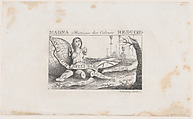Magna Britannia: Her Colonies Reduced
Designer Benjamin Franklin American
Engraver Anonymous, British, 19th century British
Not on view
This nineteenth-century copy of a 1766 print designed by Benjamin Franklin was used to illustrate The Memoirs of the Life and Writings of Benjamin Franklin (London: 1833), a book edited by the subject's grandson William Temple Franklin. The print responds to the political turmoil that followed the passage of the Stamp Act in March 1765, and its enforcement from November that same year. We are asked to imagine Britain's future if this new taxation policy continues. Britannia appears as a stone figure seated on the ground with her arms and legs severed. Weak and defenseless, she leans against a globe and weeps. Her scattered limbs are identified as Virginia, Pennsylvania, New York, and New England, and her spear, now embedded in New England, points back at her heart. A ribbon inscribed "Date Obolum Bellisario" [give a penny to Belisarius] lies across her lap to warn that military might can fail. Brooms tied to the masts of ships at right indicate that they are for sale.
Temple Franklin noted that his famous forebear, then living in London and working as Pennsylvania's colonial agent, had the image printed on cards to distribute privately as he lobbied for the repeal of the Stamp Act in the winter of 1765-66. The measure required American colonists to purchase government stamps for legal documents, newspapers and other paper goods. Colonial resentment sparked broad resistance and made the law difficult to enforce. It also encouraged boycotts that harmed British merchants. Once the act was repealed in March 1766, the British government simply sought similar alternatives. They began to enforce existing taxes on molasses and sugar imported into the colonies from the Caribbean, then, in 1767, the Townsend Acts imposed import duties on glass, lead, paint, paper and tea sent to America. Franklin's design (which he never signed or officially acknowledged) remained relevant and was republished on both sides of the Atlantic, for example as a satirical frontispiece in London's Political Register (December 1768; see MMA 24.90.1432).
This image cannot be enlarged, viewed at full screen, or downloaded.



